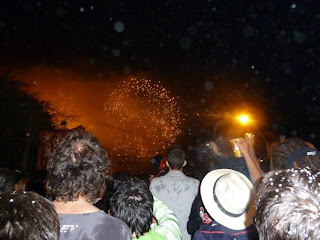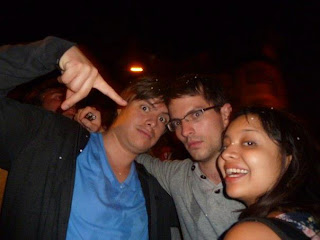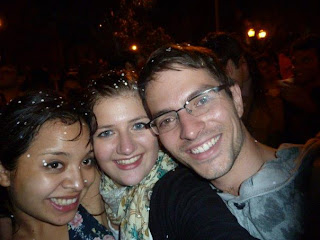













- About a month ago, I was invited to a cocktail soiree that my institute has annually for one of our best clients, Ernst & Young. I had a class at Ernst & Young, thus the reasoning behind my invite. One of my students was also invited, but I wasn't sure why she was invited and none my other students were. At the soiree, they started giving awards to the students, and it turns out my student was awarded for her attendance and most improved. Pretty cool! This happened to be the same night that I had planned to got out with some of my students. My student, Elizabeth, and I stayed at the party for a little and then met with the other students. We went to a place called Jota Cruz where I finally had chorrillana (big pile of fries topped with eggs, steak, and onion). We had a nice time together and I tried my best to keep up my end of the conversation with my Spanish. I have some pictures posted above
- On Christmas, I had a little potluck over at my place. Nothing too special. I made mashed potatoes and vegetarian chili, while my friend, Dustin, made a salmon and vegetable casserole. My friends Andrew and Jordan, along with Jordan's girlfriend, Camila, all came over for dinner. THEN, around ten or twelve more people arrived after dinner was over for drinks. I guess they didn't catch the whole "potluck" part. Turned into a nice little get together.
- For New Year's Eve, I went to Valparaiso with my friends Adam, Stephen, and his girlfriend Belen. We didn't bother getting a hostel or some place to stay because prices were as much as 7x the amount they usually were for that weekend. This is because Valparaiso has the biggest firework display in Latin America. After a cheap seafood lunch, we took a funicular to the top of a hill. That particular hill, although it had a great view, was more family-oriented and we were looking for something with a younger crowd. We ended up on this open area on a hill with TONS of young people. As soon as the clock struck midnight, people went crazy throwing confetti, spraying tons of champagne, and making out everywhere. The fireworks started at midnight and they were marvelous. They seemed to last forever (or maybe that was just the pisco I was drinking, hah!). As we came down the hill after the fireworks, there was a humongous crowd in the central plaza all partying and dancing to a concert that was going on. We stayed in Valparaiso until about 3:00 a.m., and then our sober friend, Boris, drove us back to Santiago. It was quite a night! I have some pictures posted above, but didn't get very many good shots of the fireworks. I am going to go back to Valparaiso for a proper weekend probably at the beginning of February.
WARNING: This is a big, long, pseudo-intellectual rant:
Being an English Literature major, I have a recreational interest in Linguistics. More specifically, I have an interest in Semantics, which is the study of meaning in words, phrases, sentences, etc.
For those that don't know, every noun in Spanish is designated as feminine or masculine. For example, "the table" is "la mesa" ("la" being the feminine definite article) and "the dish/plate" is "el plato" ("el" being the masculine definite article). I've known this since I first started learning Spanish, and it's probably the most basic thing you can possibly know about the Spanish language. As an English speaker, it's difficult to think of inanimate objects as having gender. I mean, who's to say that a floor is masculine and a chair is feminine!? Even things that one would expect to be masculine or feminine are actually just the opposite. For example, "war" is feminine (la guerra) and "womb" is masculine (el útero). I actually asked one of my students who determines gender when a new noun comes into the Spanish language. According to her, there is a language academy/committee similar to the French L'Académie française who determines whether a noun is considered feminine or masculine.
At some point, I started thinking about how the language of a people informs the culture and vice versa. Specifically, what does it mean for the cultural perception of gender if EVERYTHING in the language inherently has gender. What I think it means is that gender here is viewed through an essentialist lens. Meaning that men and women are viewed as having fixed traits rather than socially constructed ways of "performing" gender.
Maybe it's not solely or directly as a result of the language, but I think it's a contributing factor to the fact that there are still concretely defined roles for women and men in Chile. Of course, there are in the United States too, but I think to a lesser extent.
Eh, I'm going to go ahead and just stop here.
What originally got me thinking about this is that at my institute, our folders (that contain work schedules, etc.) are separated by gender. I guess our Australian head teacher once asked the secretaries why we couldn't just put them altogether, and they told him, "Absolutely not. This is how it should be done."
Other observations:
- Chileans seem to lack all sense of direction and I just can't explain why. My friend brought up an interesting point about this. He thought it might be because Chileans are more conservative and don't venture off too far from their homes and communities. Therefore, they are not familiar with the geography outside of their area. I'm not sure if I agree entirely with his point though. In any case, I am regularly asked for directions on the street. Not only this, but many times the directions I'm asked for are absurd. For instance, I was once asked how to get to a particular Los Leones street. I said (in Spanish), "We're on Los Leones right now...". I have driven in cars with Chileans who have lived in Santiago their entire lives, and they still "mix up" extremely well-known and busy streets.
What makes this even more ridiculous is that people are awful at GIVING directions here. When my ex-roommate and I were trying to find the Pre-Colombian Art Museum, we asked for directions from at least 3 or 4 different people and we got 3 or 4 different answers. So, in this case, either people have no sense of direction, or there is some cultural norm or attitude where it is better to give "a" direction rather to give "no" direction at all.
- I found that Chilean men really objectify women, which of course, happens in the United States, but to a lesser extent, I think. I think it's generally less public in the United States (excluding advertising, etc.). For example, men here will stare at women as they walk by and whistle at them. A couple of my female friends here have even been stopped by men who have either said everything from the really cheesy, "I think I just saw an angel" to the very lewd. The trade-off, from what I understand, is that Chilean women demand a whole helluva lot from their Chilean men in relationships. Of course, that is still no excuse for their behavior. I often wonder how that sort of objectification of women has contributed to the sort of cultural psyche of women here.
Can't think of too much else to report. I'm planning on traveling to the South at the end of February and beginning of March. Tentatively, I am planning on hitting Pucón, Valdivia, and then Patagonia (but I have to figure out where exactly in Patagonia).
No comments:
Post a Comment